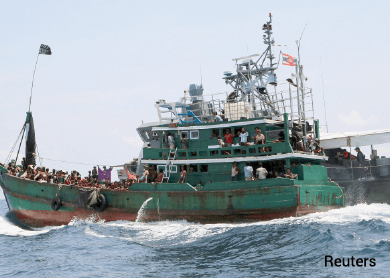
(May 22): Dewan Rakyat should debate a motion on the plight of the Rohingya and Bangladeshi refugees adrift at sea, Global Movement of Moderates chief executive officer Datuk Saifuddin Abdullah said today.
Speaking to reporters after a roundtable discussion in Kuala Lumpur on the current boat people crisis,
Saifuddin said that he would be contacting Parliament Speaker Tan Sri Pandikar Amin Mulia on Monday to appeal to him to find a way for the issue to be debated.
"If we make a presentation to the speaker, surely this issue can be debated in Parliament because that is really the Malaysian people discussing this issue in the highest formal institution in the country," he said.
Saifuddin also urged Asean to rethink its non-interference policy, saying that this caused the Rohingya problem to be silenced for a long time, and that if not for the boat people crisis facing the region, the issue would have continued to remain under the radar.
Meanwhile, Proham exco member Ivy Josiah supported the call to review the Asean principle of non-interference, stressing that Asean countries needed to discuss the Rohingya issue at the upcoming regional meeting in November.
"We need to review the non-interference policy, this way Asean countries can look out for each other and look at improving each other's lives and not wait for floating coffins before this happens again," she said.
Ivy said there was also a need for civil society to mount a national and international campaign to push for the rights of the Rohingya to be recognised, similar to the anti-apartheid campaign.
Earlier, during the roundtable discussion, Bar Council representative Andrew Khoo said there is legislation in Malaysia that protects human trafficking victims, adding that some of the boat people were victims of human smugglers.
"So the idea of returning these victims of human trafficking to their home countries is abhorrent to international law and abhorrent to the principles of our own legislation.
"We need to respect the laws we have enacted to protect victims of trafficking."
He said it was also time for Malaysia to come up with legislation to protect refugees, even if the country was not ready to sign the United Nations Refugee Convention.
He added that this must be done to protect refugees because as long as they remained in the shadows, issues like corruption and exploitation will prevail.
There were 200,000 refugees in Malaysia, of whom 150,000 are documented, Khoo said, adding this was a small number compared with the undocumented migrant workers in the country.
He suggested that instead of allowing new foreign workers in, refugees be allowed to work in Malaysia.
"Why don't we give jobs to those already here and at the same time provide them with a sense of safety and security by giving them access to schools and healthcare.
"If we invest in them, although we are concerned they could be a security threat, giving them education will reduce any potential threat they could pose."
Abim representative Adli Zakuan supported the call to give the refugees here jobs, saying that the government should consider giving them 1MM13 status, which was given to those from southern Philippines.
Meanwhile, UNHCR country representative in Malaysia Richard Towle, said that this was not a case of a tidal wave of refugees who would alter the demographics of the country.
He said the numbers of boat people at sea were small and manageable.
He added that of the slightly over 1,000 people who landed in Langkawi, 65% of them were from Bangladesh, and were eager to go back after what they went through at sea.
He said they were being processed by Bangladesh and Malaysia and once they were verified, they would be sent back as soon as possible.
Towle said this leaves about 400 who were possibly Rohingya, and would be eligible for refugee status under UNHCR registration.
He said it was estimated that another 2,000 were still adrift in boats close to the shores of Indonesia, Malaysia and Thailand, and it is estimated that 50% of them are Bangladeshi.
"So that means there is less than 1,000 refugees to be shared between Indonesia and Malaysia.
"This is not a catastrophic problem, it is perfectly manageable, so let us respond accordingly."
He added that what was important now was to adopt a humanitarian approach and to ensure that the victims were not treated as illegal migrants but as victims of exploitation and criminality.
He also said that while it was his primary duty to promote the UN convention on refugees, it was not his submission to the Malaysian government.
"Frankly, UNHCR would like to see a country not signing a convention but try to do the right thing rather than to artificially pretend that it can meet those international obligations and fall short," he said, adding that Malaysia must now put in place what it can reasonably do on a legislative and operational level with regard to the boat people crisis.
Meanwhile, civil society network Migration Working Group urged Malaysia to immediately conduct search and rescue efforts for all boats adrift at sea.
They also want Asean member states to engage the Myanmar government in addressing the root causes of flight by the Rohingya, which include reducing ethnic violence, improving human rights standards and conferring citizenship rights. – The Malaysian Insider